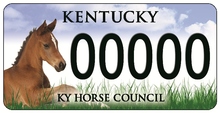A diverse coalition of stakeholders have praised the leadership of state lawmakers Rep. Tom McKee and Sen. Robin Webb, the entire Kentucky Legislature, and Gov. Steve Beshear for enacting a measure to reduce the hold period for stray horses from 90 days to 15 days.

Specialty Kentucky license plate
A new law to reduce the hold period for stray horses from 90 days to 15 days will allow more positive outcomes for horses and the local communities since horse can be cared for and rehomed much sooner.
© 2015 by Kentucky Horse Council
This new law will allow for more positive outcomes for horses and the local communities by significantly shortening the amount of time a stray horse must be held before the animal can be rehomed, and decreasing the high costs for local officials to care for the horses.
Prior to the enactment of H.B. 312, which takes effect in June 24, 2015, Kentucky had the second highest hold period in the country at 90 days. This new law brings Kentucky more in line with bordering states that all have 10-day hold periods.
H.B. 312 was introduced to address a growing population of stray and abandoned horses in rural Kentucky areas that has been increasing at a rate that is not sustainable. Many of these domestic horses have been turned out to survive on their own, something they are ill-equipped for, resulting in horses migrating onto roadways and private properties in search of food, creating public safety problems.
The lengthy stray hold period has been a deterrent to communities, individuals, and groups who step in to care for these horses, which can cost them thousands of dollars in unbudgeted expenditures.
This commonsense solution is supported by a diverse group of individuals and organizations, including the following:
- American Society for the Prevention of Cruelty to Animals
- Kentucky Animal Care & Control Association
- Kentucky Association of Counties
- Kentucky County Judge Executives Association
- Kentucky Department of Agriculture, Office of the State Veterinarian
- Kentucky Equine Education Project
- Kentucky Equine Health & Welfare Council
- Kentucky Farm Bureau
- Kentucky Horse Council
- Kentucky Humane Society
- Kentucky Equine Humane Center
- United Global Co-Opportunities
- We Make Things Happen
âThe passage of House Bill 312 is a critical achievement for the Commonwealth of Kentucky that will eliminate the legal barriers that have long been in place, preventing the stray horses from receiving dependable feed and shelter and finding permanent homes,â said the coalition in a joint statement.
âWe are grateful to Representative McKee and Senator Webb, who championed this bill, and to Governor Beshear for quickly signing it into law to expedite the legal process and ensure these at-risk horses have a better chance at finding permanent homes by receiving care more quickly.â
The new law will not impact the hold times of any other species of animal, nor will it infringe upon or limit the rights of responsible horse owners.
For more information, contact the Kentucky Horse Council at (859) 367-0509.
About The Kentucky Horse Council
The Kentucky Horse Council is a non-profit organization dedicated, through education and leadership, to the protection and development of the Kentucky equine community.
The Kentucky Horse Council provides educational programs and information, outreach and communication to Kentucky horse owners and enthusiasts, equine professional networking opportunities through KENA, trail riding advocacy, health and welfare programs, and personal liability insurance and other membership benefits.
The specialty Kentucky Horse Council license plate, featuring a foal lying in the grass, provides the primary source of revenue for KHC programs.
